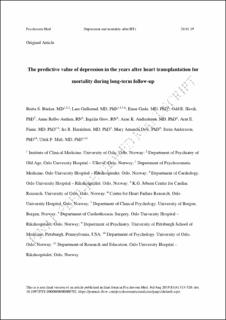The predictive value of depression in the years after heart transplantation for mortality during long-term follow-up
Bürker, Britta Susanne; Gullestad, Lars; Gude, Einar; Havik, Odd E.; Relbo, Anne; Grov, Ingelin; Andreassen, Arne K.; Fiane, Arnt E; Haraldsen, Ira Hebold; Dew, Mary Amanda; Andersson, Stein; Malt, Ulrik Fredrik
Journal article, Peer reviewed
Accepted version
Permanent lenke
https://hdl.handle.net/11250/2738635Utgivelsesdato
2019Metadata
Vis full innførselSamlinger
Sammendrag
Objective
Current understanding of the prognostic impact of depression on mortality after heart transplantation (HTx) is limited. We examined whether depression after HTx is a predictor of mortality during extended follow-up. Subsequently, we explored whether different symptom dimensions of depression could be identified and whether they were differentially associated with mortality.
Methods
Survival analyses were performed in a sample of 141 HTx recipients assessed for depression, measured by self-report of depressive symptoms (Beck Depression Inventory – version 1A [BDI-1A]), at median 5.0 years after HTx, and followed thereafter for survival status for up to 18.6 years. We used uni- and multivariate Cox proportional hazard models to examine the association of clinically significant depression (BDI-1A total score ≥10), as well as the cognitive-affective and the somatic subscales of the BDI-1A (resulting from principal component analysis) with mortality. In the multivariate analyses, we adjusted for relevant sociodemographic and clinical variables.
Results
Clinically significant depression was a significant predictor of mortality (hazard ratio = 2.088; 95% confidence interval = 1.366–3.192; p = .001). Clinically significant depression also was an independent predictor of mortality in the multivariate analysis (hazard ratio = 1.982; 95% confidence interval = 1.220–3.217; p = .006). The somatic subscale, but not the cognitive-affective subscale, was significantly associated with increased mortality in univariate analyses, whereas neither of the two subscales was an independent predictor of mortality in the multivariate analysis.
Conclusions
Depression measured by self-report after HTx is associated with increased mortality during extended follow-up. Clinical utility and predictive validity of specific depression components require further study.

